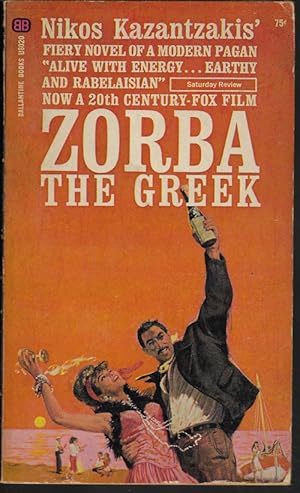


The narrator and Zorba have a great many lengthy conversations, about a variety of things, from life to religion, each other's past and how they came to be where they are now, and the narrator learns a great deal about the human condition from Zorba that he otherwise had not gleaned from his life of books and paper. Quite frequently Zorba works long hours, and requests not to be interrupted while working. If you're kind to him, he plucks your eyes out." Zorba himself plunges into the work, which is characteristic of his overall attitude, which is one of being absorbed in whatever he is doing or whomever he is with at any particular moment. If you're cruel to him, he respects and fears you. The narrator, who has socialist ideals, attempts to get to know the workers, but Zorba warns him to keep his distance: "Man is a brute. The next day, the mine opens and work begins. Zorba gives her the pet-name "Bouboulina" (likely inspired by the Greek heroine) while he takes the pet-name "Canavaro" (after real-life Admiral Canevaro, a past lover claimed by Hortense). On returning to the hotel for dinner, the pair invite Madame Hortense to their table and get her to talk about her past as a courtesan. The narrator spends Sunday roaming the island, the landscape of which reminds him of "good prose, carefully ordered, sober… powerful and restrained" and reads Dante. They are forced by circumstances to share a bathing-hut. On arrival, they reject the hospitality of Anagnostis and Kondomanolious the café-owner, and on Zorba's suggestion make their way to Madame Hortense's hotel, which is nothing more than a row of old bathing-huts. On their way to Crete, they talk on a great number of subjects, and Zorba's soliloquies set the tone for a large part of the book. The narrator is fascinated by Zorba's lascivious opinions and expressive manner and decides to employ him as a foreman. He claims expertise as a chef, a miner, and player of the santouri, and introduces himself as Alexis Zorba, a Greek born in Macedonia. The man enters and immediately approaches him to ask for work. He is about to begin reading his copy of Dante's Divine Comedy when he feels he is being watched he turns around and sees a man of around sixty peering at him through the glass door of the café. He sets off for Crete to re-open a disused lignite mine, and immerse himself in the world of peasants and the proletariat. The narrator, a young Greek intellectual, resolves to set aside his books for a few months after being stung by the parting words of a friend, Stavridakis, who has left for the Russian Caucasus to help the local Greek communities who are facing persecution. The book opens in a café in Piraeus, just before dawn on a gusty autumn morning sometime after the end of World War I.


 0 kommentar(er)
0 kommentar(er)
